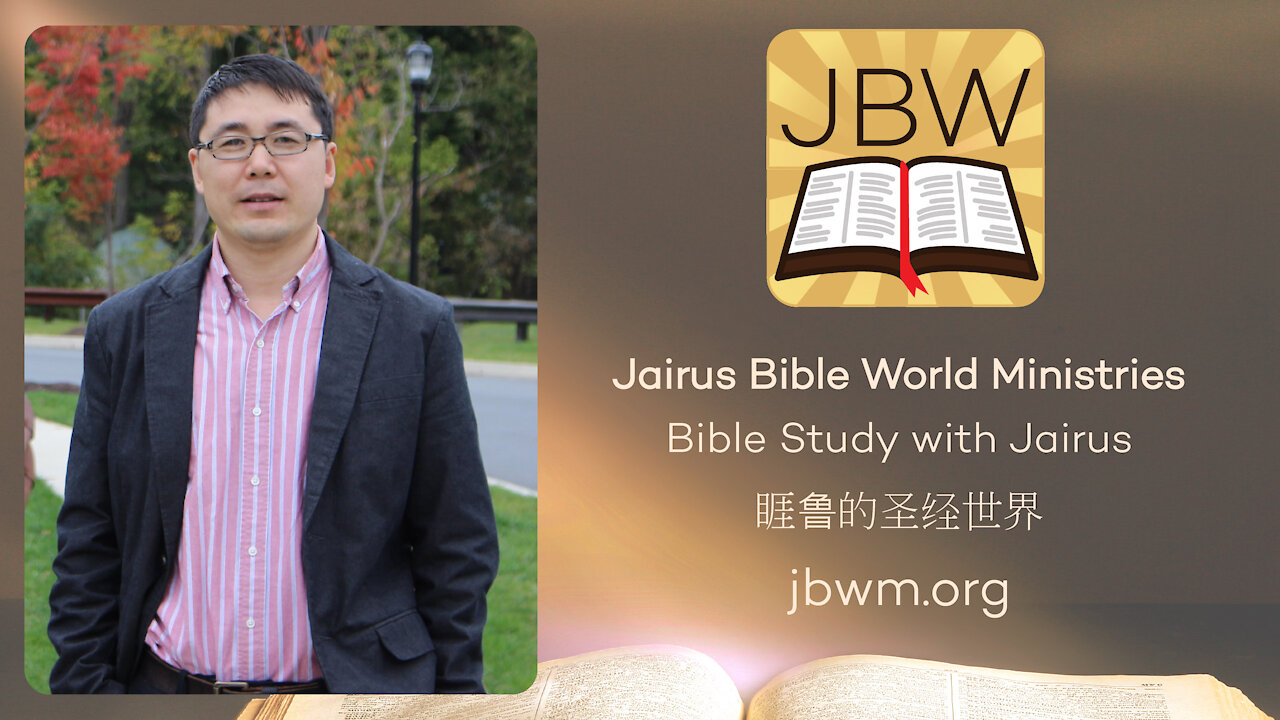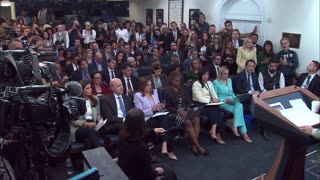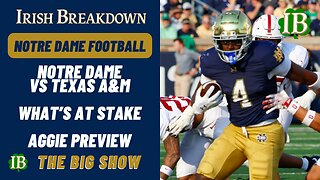Premium Only Content

Bible Study with Jairus – Leviticus 27
Chapter 27 is the last chapter of the book of Leviticus. It talks about Jehovah giving Moses the laws concerning people's vows and dedications. The value that is set on each person when one makes a vow is not the same. A male has a higher value than a female, older people and children have a lower value (verses 1-8). If a man has already dedicated himself to the Lord, he must not exchange or substitute it. Although the animal and house that he dedicated can be redeemed, a fifth must be added to its value (verses 9-15). If a man who dedicates a field wishes to redeem it, he must add a fifth to its value. If he does not redeem the field, it can never be redeemed (verses 16-25). An animal's firstborn must not be dedicated; he may repurchase the unclean animal after adding a fifth of the value to it. If he does not redeem it, it will be sold at its set value (verses 26-27). But nothing that a man owns and devotes to the Lord may be redeemed (verse 28). No person devoted to destruction may be ransomed (verse 29). A tithe of everything from the land belongs to the Lord. If a man redeems any of his tithe, he must add a fifth of the value to it (verses 30-31).
Leviticus 27:32-33 says,
32 Every tithe of the herd and flock—every tenth animal that passes under the shepherd's rod—will be holy to the LORD. 33 No one may pick out the good from the bad or make any substitution. If anyone does make a substitution, both the animal and its substitute become holy and cannot be redeemed.'" (NIV)
The last verse says, "These are the commands the LORD gave Moses at Mount Sinai for the Israelites" (NIV, Leviticus 27:34)
One Christian who shared at the beginning of this meeting didn't understand what verses 32-33 meant. Why couldn't they pick out the good from the bad or make any substitution? And if anyone did make a substitution, the animal and substitute became holy and couldn't be redeemed?
Although we have briefly outlined what Leviticus 27 is talking about, when people read the Bible, they often get confused and don't understand what they are reading. Is this your experience when you read the Bible? I remember reading a survey about Christians reading the Bible. The first reason why Christians don't read the Bible is not that they are lazy, but rather because they don't understand it. Sometimes after reading the Bible, they don't know what it is saying or how it applies to their lives.
If you have finished reading this chapter of the Bible, what do you think it's talking about? I often say that our understanding of the Bible can limit the growth of our spiritual life. For example, how can a person who doesn't understand the Bible or doesn't usually read the Bible be changed by the Word of God? The spiritual growth of new believers is subject to the limitation of their knowledge of the Word of God.
On the other hand, a person can thoroughly read the Bible from cover to cover and only see it as words on a page rather than a living word. They don't possess the spiritual experience of the Bible and have a limited understanding.
The Chinese are very wise in this area. Although Chinese people don’t have a long history of studying the bible, they have a lot of experience understanding the world. For example, the Chinese say that a person can only better understand the world and become a useful person if he/she "travels ten thousand miles and reads ten thousand books." This is a very philosophical statement.
"Reading ten thousand books" is like the first example of when we read the Bible. We need to read more about the Bible and various spiritual works. We must also listen to other pastors' teachings to help us understand the Bible and glean as much spiritual knowledge as possible.
"Traveling ten thousand miles" is like a Christian who regards prayer as essential and who enjoys pursuing spiritual truths. Through the Holy Spirit working in him and his circumstances, he learns how to deal with the flesh, control his mind, live in the spirit, and become deeply rooted in the Lord.
The two are inseparable and complement each other. Of course, I advocate reading the Bible more and reading it every day. I was saved in the Local Church movement and was taught to read three chapters in the Old Testament and one chapter in the New Testament every day. We can read through the whole Bible this way in a year. I still insist on doing this every day. Every morning, I read three chapters in the Old Testament and one chapter in the New Testament, and I find a verse that moves me. I use this verse to practice pray-reading, which is meditation during lunch break. It has been very beneficial to me. In addition to attending the meetings in the Local Church, I diligently read the spiritual works of Watchman Nee and Witness Lee...
Read more:
https://jbwm.org/bible-study-with-jairus-leviticus-27/
-
 1:19:45
1:19:45
The White House
6 hours agoPress Secretary Karoline Leavitt Briefs Members of the Media, Sep. 9, 2025
26.4K17 -
 1:24:12
1:24:12
Mark Kaye
3 hours ago🔴 ICE Invades Chicago- Operation Midway Blitz
18.6K1 -
 LIVE
LIVE
Badlands Media
12 hours agoGeopolitics with Ghost Ep. 37- Sept. 9, 2025
998 watching -
 4:07
4:07
Michael Heaver
3 hours agoBattered Germany Quickly Erupting Into PANIC
11.2K6 -
 1:05:32
1:05:32
Timcast
4 hours agoNepal's Government COLLAPSES, Gen Z REVOLUTION Over Social Media Ban, 19 Dead
108K91 -
 2:06:23
2:06:23
Steven Crowder
6 hours agoBrian Stelter's Delusional Response to the Charlotte Stabbing is Everything Wrong With Media
304K265 -
 1:23:34
1:23:34
The Mel K Show
3 hours agoMORNINGS WITH MEL K - Suicidal Empathy, Denial of Truth & Rewriting History as a Weapon 9-9-25
23K5 -
 1:15:30
1:15:30
Clownfish TV
3 hours agoXbox Game Pass Fail! Paranormal Chum Bucket, More! | DREZZED News Live
15.9K -
 1:34:42
1:34:42
IrishBreakdown
4 hours agoNotre Dame vs Texas A&M Preview - Irish Must Show Grit In Home Opener
16.9K -
 1:22:18
1:22:18
Rebel News
3 hours agoPoilievre on housing crisis, Eby backs ending TFWP, Media mocks Alberta 'book ban' | Rebel Roundup
20.8K3